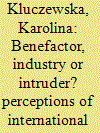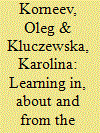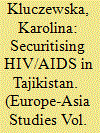|
|
|
Sort Order |
|
|
|
Items / Page
|
|
|
|
|
|
|
| Srl | Item |
| 1 |
ID:
153710


|
|
|
|
|
| Summary/Abstract |
Soon after the breakdown of the Soviet Union in 1991, a civil war started in Tajikistan (1992–97). This was also the period when a number of international organizations arrived in the country to distribute humanitarian assistance and assist in conflict resolution and stabilization. After the UN, the Organization for Security and Co-operation in Europe (OSCE) was the second key organization which appeared in the conflict-stricken country. Like other key international organizations in Tajikistan, the OSCE, which has been in the country since 1994, has seen a shift in its original functions of monitoring and emergency assistance. Some see its avowed objectives in the new century as formalistic, virtual and ineffective. By capturing perceptions of foreign assistance to Tajikistan among employees of the OSCE and other international organizations, NGO workers, government officials and ordinary citizens, this article explores how Tajikistan ‘socialized’ the OSCE, making the organization simultaneously a benefactor, an industry and even an intruder.
|
|
|
|
|
|
|
|
|
|
|
|
|
|
|
|
| 2 |
ID:
190174


|
|
|
|
|
| Summary/Abstract |
Examining the European Union’s (EU) engagement with Central Asia since the early 1990s, we see an increased commitment to context sensitivity. Arguably, in order to design ‘better’ interventions, the EU needs to know more about this region. This article explores three means of EU learning: in the field – through EU officials’ first-hand experience of working at EU Delegations in Central Asia; about the field – through programmed channels of external expert knowledge, and in particular think tanks; and from the field – during institutionalized consultations with multiple local actors, such as academics, journalists and non-governmental organizations. It is argued that despite this complex learning infrastructure, EU knowledge production on Central Asia has a predominantly performative character. Rather than leading to changes in its relations with Central Asia, new knowledge produced by the EU aims at legitimizing this organization’s pre-existing frameworks of engagement and practices of interactions with the region, and substantiating existing policy priorities.
|
|
|
|
|
|
|
|
|
|
|
|
|
|
|
|
| 3 |
ID:
183967


|
|
|
|
|
| Summary/Abstract |
Building on previous work on the securitisation of HIV/AIDS, studies of framings, and the Copenhagen and Paris schools of security studies, this essay explores how policy framings of HIV/AIDS have shifted from the late Soviet period through to present-day Tajikistan. Pointing to both continuity and change, it shows how, under the influence of international actors and in accordance with nation-building priorities, Soviet-era medical and societal security framings gradually transformed into state security, demography and family-oriented framings. It also examines the resulting policy responses and practices that influence the everyday life of social groups who become identified as a public health concern.
|
|
|
|
|
|
|
|
|
|
|
|
|
|
|
|
|
|
|
|
|